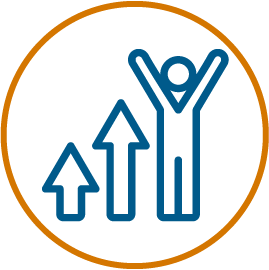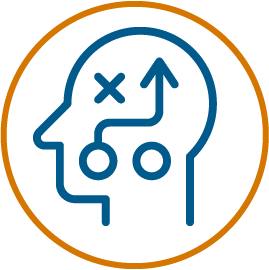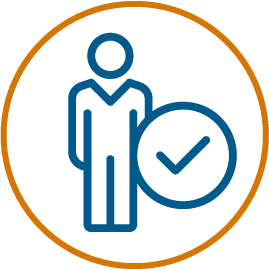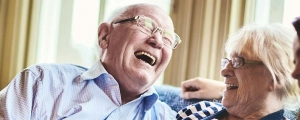Learn to analyze the impact of aging on the individual and society, and prepare for a career working with and advocating for people age 65 and older.
Program Type
Bachelor's
Semester Start
Fall
Study Options
Hybrid
Minimum Duration
4 Years
 UMass Boston’s Aging Studies BA was ranked as one of the Best Online Bachelor's Programs by U.S. News & World Report. This program focuses on training and preparing you for management positions in the fields of advocacy, education, marketing, product development, service provision, management, administration, program planning, and research. It’s designed for students who want to work with and advocate for the fastest growing segment of the world population, adults age 65 and older. This program will help you develop skills and add a degree to your résumé. The world’s population is aging at an unprecedented rate, affecting the way societies around the globe deal with the growing number of older people. Explore the issues, questions, perspectives, needs, and contributions of older people and compare the opportunities and challenges associated with aging populations internationally. Apply these skills to virtually any field — from advocacy to research to management, and more. You can also continue your studies for an extra year, as part of the Accelerated Bachelor’s to Master’s Program (AMP), to earn a Management of Aging Services MS or Gerontology MS from UMass Boston.*
UMass Boston’s Aging Studies BA was ranked as one of the Best Online Bachelor's Programs by U.S. News & World Report. This program focuses on training and preparing you for management positions in the fields of advocacy, education, marketing, product development, service provision, management, administration, program planning, and research. It’s designed for students who want to work with and advocate for the fastest growing segment of the world population, adults age 65 and older. This program will help you develop skills and add a degree to your résumé. The world’s population is aging at an unprecedented rate, affecting the way societies around the globe deal with the growing number of older people. Explore the issues, questions, perspectives, needs, and contributions of older people and compare the opportunities and challenges associated with aging populations internationally. Apply these skills to virtually any field — from advocacy to research to management, and more. You can also continue your studies for an extra year, as part of the Accelerated Bachelor’s to Master’s Program (AMP), to earn a Management of Aging Services MS or Gerontology MS from UMass Boston.*
Tuition
- This program consists of forty 3-credit courses, or 120 credits.
- Online tuition is $410 per credit.
- Total estimated tuition cost to complete this program is $49,200.
- Estimate is based on completing program by minimum duration. Other fees apply. Request Info to connect with a program representative for further details.
Deadlines
- All first year freshman – domestic and international – can apply for non-binding Early Action by November 1 with the deadline for all credentials received by November 14.
- When applying for Regular Decision, the deadline is March 1 with credentials due by March 15.
Application Checklist
- The completed application
- Your high school transcript (an official copy including your first term or first semester senior year grades)
- First-year students’ applications can be reviewed by the Office of Undergraduate Admissions and admitted to the university after submitting at least one marking period from your senior year. You'll be required to submit a final high school transcript that indicates you have met the graduation requirements by July 15. It is expected that applicants accepted during their senior year in high school maintain a consistent performance.
- SAT or ACT scores (unless applying with No Test Option)
- Essay (at least 500 words)
- All UMass Boston applicants are asked to submit a personal essay. It gives you the opportunity to present yourself in a way that grades and test scores cannot. Our admissions counselors use your essay to determine your ability to organize your thoughts and express yourself clearly.
- The admission essay is also used in consideration for admission to the university’s Honors College or scholarship opportunities for qualified applicants.
- Please select one of the following questions and write an essay of about 500 words:
- Evaluate a significant experience, achievement, risk you have taken, or ethical dilemma you have faced and its impact on you.
- Discuss some issue of personal, local, national, or international concern and its importance to you.
- Indicate a person who has had a significant influence on you, and describe that influence.
- Describe a character in fiction, a historical figure, or a creative work (as in art, music, science, etc.) that has had an influence on you and explain that influence.
- A range of academic interests, personal perspectives, and life experiences adds much to the educational mix. Given your personal background, describe an experience that illustrates what you would bring to the diversity in a college community or an encounter that demonstrated the importance of diversity to you.
- Topic of your choice.
- Academic Recommendation Letter (from a school-based counselor and/or teacher)
- Application fee ($60) paid by credit or debit card
- Verification of English language proficiency (for non-native speakers of English)
- If you are not a native speaker of English, you are required to demonstrate your English language proficiency in one of the following ways:
- SAT: Minimum score of 480 within the Evidence Based Reading & Writing section
- TOEFL: Minimum score of 79-80 (internet-based)
- IELTS: Minimum score of 6.0
- Successful completion of the UMass Boston University Preparation Program
- You must submit official copies of scores directly to University of Massachusetts Boston. The CEEB code is 3924.
- If you are not a native speaker of English, you are required to demonstrate your English language proficiency in one of the following ways:
All documents can be mailed to:
University of Massachusetts Boston
Undergraduate Admissions Processing Center
100 Morrissey Boulevard
Boston, MA 02125-3393
Advanced Placement Credit
- First-year freshmen may be awarded university credit for exhibiting college level proficiency through Advanced Placement examinations.
- The AP Credit Policy Chart shows the required AP scores to receive course credit. All scores must be sent directly from The College Board to the Office of Undergraduate Admissions.
Required Courses:
- Frontiers in Global Human Aging (GERON 150)
Get an overview of research and knowledge in human aging. You’ll build a framework for understanding the biopsychosocial aspects of human aging and the characteristics of older adults in the world today. Explore the latest findings across many disciplines that study global aging (e.g., psychology, sociology, political science, public health, social work, nursing). For example, you’ll explore a number of variables that are important to human aging such as personal health and well-being, social support, and race and cultural contributions to the life course. You’ll also learn the basic aspects of planning and delivering health and social services for older adults. - Global Aging and the Life Course (GERON 160)
Get an introduction to the major topics, concepts, and terminology in life course studies using a global comparative perspective. You’ll build a framework for understanding aging populations and aging individuals and consider how different cultures and contexts influence attitudes toward aging and the aged. Case studies and essays from international gerontology scholars will be presented and studied. - Mental Health and Aging (GERON 250)
Get a comprehensive overview of psychological aspects of aging. This course is organized into three broad sections. 1) In the first section of this course, you will become aware of the increasing population of older adults, methods in aging studies, biological theories, physical changes, quality of life and longevity, common diseases, and person -environment interactions. 2) The second section of this course will cover attentional processes, types of memory, intelligence, and social cognition. 3) For the final section of this course, you’ll focus on mental health. Specifically learning about changes in personality with age, psychological, and cognitive disorders including depression, anxiety, dementia, relationships throughout the lifespan, death and dying, and end of life care. To finish the semester, you will reflect back on what you have learned and focus on how you can successfully age and encourage others to do so also. - Health and Physical Aspects of Aging (GERON 260)
In this course, you’ll focus on the physical changes in the body associated with normal aging. There is a lessened reserve capacity in all organ systems in the body that increases susceptibility to disease and illness. Emphasis is on health promotion and disease and disability prevention. - Applied Research in Aging (GERON 325)
This course is a project in conjunction with a community organization about an issue affecting the elderly. You’ll learn to clearly articulate significant questions, develop a research methodology, prepare instruments, and gather data that informal debate on the issue. You will participate in the design and implementation of a group field project. You’ll also use mixed methods to explore the attitudes and behavior of these older adults. - Aging and Society (GERON 342L)
Get an overview of aging across the life course. You’ll cover various topics, including the sociological components of aging from birth through childhood, young adulthood, adulthood, old age, and dying. Special emphasis is placed on the impact of gender, race, and social class on the aging process in the United States. - Field Placement I (GERON 401)
This course provides an opportunity for you to experience a field placement in a global setting. This cross-national placement will provide you with a guided practical experience in gerontology in a variety of possible settings. Field placements may vary in length to accommodate the needs of the site and students (range of 1-4 weeks). - Global Aging II (GERON 440)
This advanced undergraduate course offers you a comprehensive coverage of population aging around the world. Throughout the semester, you become familiar with how people age differently in various cultures and how individuals, governments, and organizations adapt to meet the needs of this demographic change.
Electives (Pick Four):
- Policy and Aging (GERON 240)
Get an overview of policy and aging. The course provides you with a general framework for understanding and analyzing social policy and introduces you to the study of public policy. In addition, you’ll get an overview of aging policy in the United States, with attention to financial security, access to health care, long-term care, and the Older Americans Act. You are also introduced to policy analysis. This course includes two sections: the first section introduces the legislative bodies and administrative agencies. This section allows you to critically analyze the state legislative process and to master verbal reasoning skills necessary to engage in strategic planning for influencing the decision makers. The second section provides a general framework for understanding and analyzing social policy and introduces you to the study of public policy. - Families in Later Life (GERON 350)
In this course, you’ll get an overview of major areas of research on later life families. Develop and evaluate research dealing with families in later life. You’ll learn about theoretical bases of research and special methodological issues facing family researchers. Selected substantive topics include intimate relationships in later life, intergenerational relationships, sibling relationships, the demographics of later life families, family caregiving, and policy issues. - Service Delivery Issues for Aging Populations (GERON 355)
Explore the link between consumers and aging services in settings with well-developed formal services. The aim of the course is to provide you with an understanding of the structural problems that underlie the challenges that consumers face in using formal services. You’ll cover a wide range of services that older people may need; the complementary relationship between formal and informal services; boundaries issues among service specialties and service professionals, service coordination and integration; and the role of both consumer direction and professional case management in negotiating service systems. - Environmental Gerontology (GERON 415)
Examine the major topics and concepts in environmental gerontology. The micro-level interventions (e.g. home modifications, products for older adults) have become a component of a newer, larger movement: Age-Friendly Communities. This course will provide you with a comprehensive overview of design interventions for older adults. You’ll cover important related theories and frameworks, details of home modifications, aspects of age-friendly communities (urban, suburban, and rural - both public and private), and important policies that inform this work. You’ll have an opportunity to conduct environmental micro- and macro-level audits and to interview allied professionals. Readings will provide details that you can immediately apply to your current aging services work. - Global Aging Field Placement II (GERON 441)
This advanced course provides an opportunity for you to experience a field placement in a global setting. This cross-national placement will provide you with a guided practical experience in gerontology in a variety of possible settings. Field placements may vary in length to accommodate the needs of the site and students (range of 1-4 weeks).
General Education Requirements (84 credits)
The general education curriculum at UMass Boston gives you multiple opportunities to build and improve upon your academic foundation to provide you with a strong foundation for success in future courses and your career. You will be exposed to the fundamental ideas and intellectual activities that students and faculty across campus and around the world – in the arts, humanities, business, and the social and natural sciences – utilize in scholarship. General Education course topics include:
- English
- Science
- Math
- Arts and Humanities
- Social and Behavioral Sciences
- World Languages and World Cultures
- Foreign Language
At the end of this four-year program, you’ll be awarded a Bachelor of Arts in Aging Studies. The degree will demonstrate your expertise in the field on your résumé, as well as in interviews and workplace evaluations. You can apply your knowledge to management positions in the fields of advocacy, education, marketing, product development, service provision, management, administration, program planning, and research. You can also continue your studies for an extra year, as part of the Accelerated Bachelor’s to Master’s Program (AMP), to earn a Management of Aging Services MS or Gerontology MS from UMass Boston.
Why UMass Boston Online?
Value
Among the lowest online tuition rates of an accredited, public research university.
Flexibility
Study full-time to finish fast, or part-time to suit your schedule. Live sessions scheduled with the working professional in mind.
Authenticity
The same courses taught by the same academic departments as on campus. No third-party providers.
Learn More






